We may not have the course you’re looking for. If you enquire or give us a call on +46 850282424 and speak to our training experts, we may still be able to help with your training requirements.
We ensure quality, budget-alignment, and timely delivery by our expert instructors.

Imagine having access to powerful computing resources without needing to own expensive hardware. That’s exactly what Amazon Web Services (AWS) offers, providing businesses with a cloud platform for various services like storage, computing, and databases. But What is AWS, and why is it so important in today’s tech world? In this blog, we will discuss the history of AWS, its benefits, how it works, and its key services. We will also explore its pricing models, competition, and common use cases, helping you understand why AWS is a game-changer for businesses worldwide.
Table of Contents
1) What is AWS?
2) History of AWS
3) Why is AWS Important?
4) How Does AWS Work?
5) AWS Benefits and Drawbacks
6) Applications of AWS
7) AWS Pricing Models, Competition and Customers
8) AWS Services
9) What is the Most Popular Language for AWS?
10) What is the Most Common AWS Database?
11) Conclusion
What is AWS?
Amazon Web Services (AWS) is a Cloud Computing platform provided by Amazon. It has become a major part of Amazon's business and is one of the most successful cloud services in the world.
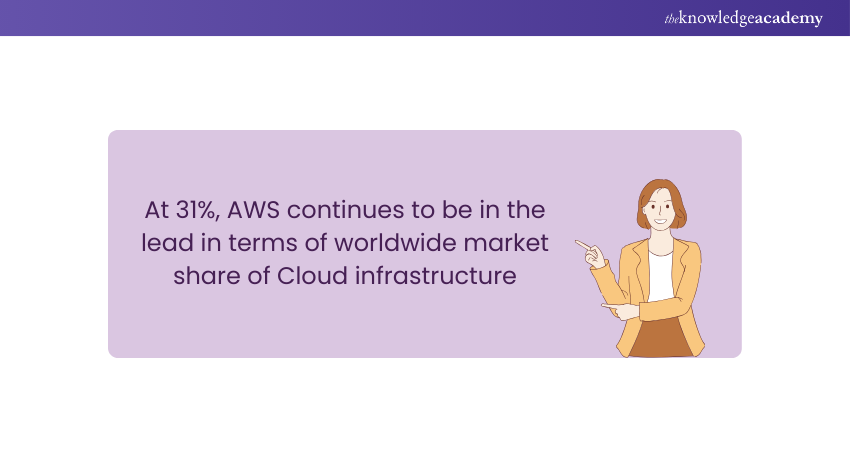
AWS offers a broad range of cloud services, including servers, storage, networking, email, mobile development, and security. Some of its key products include:
a) EC2: A service that provides virtual machines.
b) Glacier: A low-cost cloud storage service.
c) S3: Amazon's storage system.
In the first quarter of 2025, AWS generated £20.25 billion in sales, reflecting its consistent growth. It has emerged as one of the top cloud platforms, leading competitors like Microsoft Azure. When comparing bold AWS vs Azure, it’s evident that AWS maintains a dominant position in the cloud industry, capturing over a third of the market share with 31%. Its closest rivals, Microsoft Azure and Google Cloud, hold 25% and 11% of the market, respectively.
AWS operates from 105 availability zones, spread across different regions. This helps ensure that services are reliable and secure, with data stored in various locations for safety.
History of AWS
AWS was launched in 2002 with a few basic services, and it has evolved rapidly over the years. In 2003, Amazon transformed the platform to standardise and automate its computing infrastructure, focusing on web services and offering virtual servers as a service that laid the foundation for the AWS Future. By 2004, AWS debuted its first service, Amazon SQS, marking the start of its cloud journey.
In 2006, AWS relaunched with Amazon S3, SQS, and EC2, solidifying its position as a comprehensive suite of core online services. As AWS grew, it expanded S3 and EC2 into Europe in 2009 and introduced Elastic Block Store and Amazon CloudFront. The platform added certifications in 2013 and launched autoscaling in 2018 to enhance resource management.
In 2022, AWS introduced over 110 new features, including AWS CodeCatalyst for app development and AWS Application Composer, a low-code tool for serverless apps. Other highlights included AWS Security Lake, AWS VPC Lattice for enhanced network management, and AWS Supply Chain for streamlined planning.
Today, AWS offers over 200 services, supported by a global network of data centres. With its continuous expansion and commitment to innovation, AWS remains a leading choice for businesses embracing the cloud.
Why is AWS Important?
AWS is important because it allows businesses to use powerful computing resources without having to own or manage expensive hardware. This helps companies save money, as they only pay for what they use instead of buying servers and equipment. AWS provides flexible services like storage, computing power, and networking, which makes it easier for companies to grow and manage their operations efficiently.
AWS offers a reliable and secure platform for businesses to store and manage their data. With many data centers around the world, AWS ensures that services run smoothly and that data remains safe. It also provides businesses with the flexibility to quickly scale up or down based on their needs. Whether you're exploring roles like the AWS Developer Associate vs Solutions Architect, AWS proves to be a key tool for companies of all sizes.
How Does AWS Work?
AWS, or Amazon Web Services, is a versatile cloud platform trusted by businesses of all sizes worldwide. Whether you’re a small startup or a large enterprise, AWS helps you innovate, scale, and reduce costs efficiently. Below is a breakdown of how AWS functions and the benefits it offers:
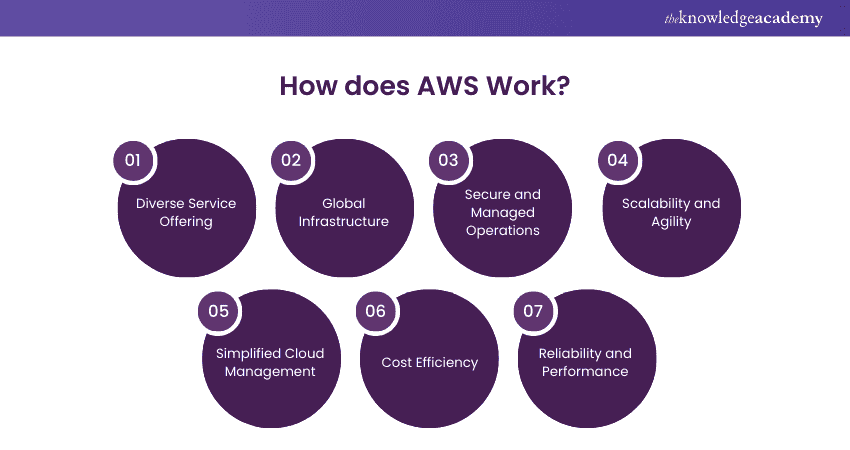
a) Diverse Service Offering: AWS provides a wide array of cloud services, making it adaptable for various industries and applications. From computing power to storage solutions, AWS can meet your unique cloud needs. This diversity makes AWS adaptable for almost any industry—whether you're in healthcare, finance, media, or retail, AWS has a solution for you.
b) Global Infrastructure: AWS operates through a global network of physical data centres located in various regions. These data centres, known as Availability Zones, are interconnected via a high-speed, secure fibre network. This setup ensures that your data is stored safely and can be accessed quickly from anywhere.
c) Secure and Managed Operations: AWS takes care of all heavy lifting when it comes to running web applications. The platform handles security, maintenance, and updates, so you can focus on your business, not the backend. With compliance certifications worldwide, AWS provides a secure environment that meets even the most rigorous regulatory requirements.
d) Scalability and Agility: AWS's flexible cloud solutions enables businesses to scale resources up or down based on demand. This scalability is crucial for businesses facing fluctuating workloads or planning rapid growth. By leveraging AWS, companies can launch new applications quickly, and adjust capacity as needed.
e) Simplified Cloud Management: AWS offers managed services like Amazon Relational Database Service (Amazon RDS), which automates time-consuming tasks such as backups, updates, and scaling. This means you can easily run your preferred database with just a few clicks, freeing up time to focus on critical business activities.
f) Cost Efficiency: AWS helps businesses lower operational costs by only charging for the resources they use. This pay-as-you-go model eliminates the need for expensive upfront investments in hardware and software. By using AWS, you can better control and optimise costs, making it a cost-effective choice for organisations of all sizes.
g) Reliability and Performance: AWS's robust global infrastructure ensures high availability and low-latency performance. Data replication across multiple Availability Zones guarantees that your applications remain up and running. This reliability is important for businesses that rely on consistent performance and uptime.
AWS Benefits and Drawbacks
Here are several AWS benefits and drawbacks that you need to know:
Benefits
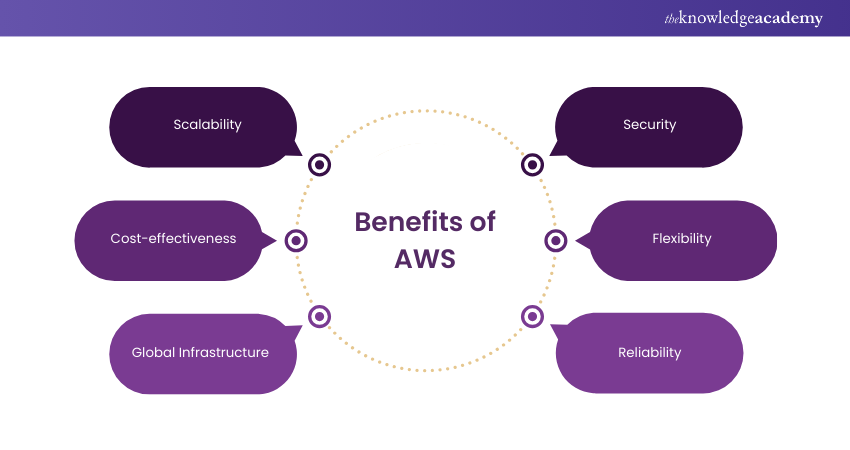
a) Scalability: AWS has developed intelligent elastic scalability so businesses can quickly ramp up or down their resources depending on demand.
b) Cost-effectiveness: Adopting a pay-per-use fee structure enables businesses to pay only for what is now used, replacing the need to make prior investments in hardware.
c) Global Infrastructure: AWS has a globally distributed infrastructure of data centres, thereby allowing the clientele to benefit from low latency and high accessibility near their geographic region.
d) Security: AWS security and compliance are among the first things the platform provides. To protect customers’ data securely and efficiently, it provides a range of Cyber Security features and certifications.
e) Flexibility: AWS assures provision of the whole hosting infrastructure, which gives organisations the freedom to form, create, and deploy applications lightning fast.
f) Reliability: AWS comes with a Service-Level Agreement (SLA) that subscribes to your services to prevent the systems from being down all the time and ensure that the business is running.
Drawbacks
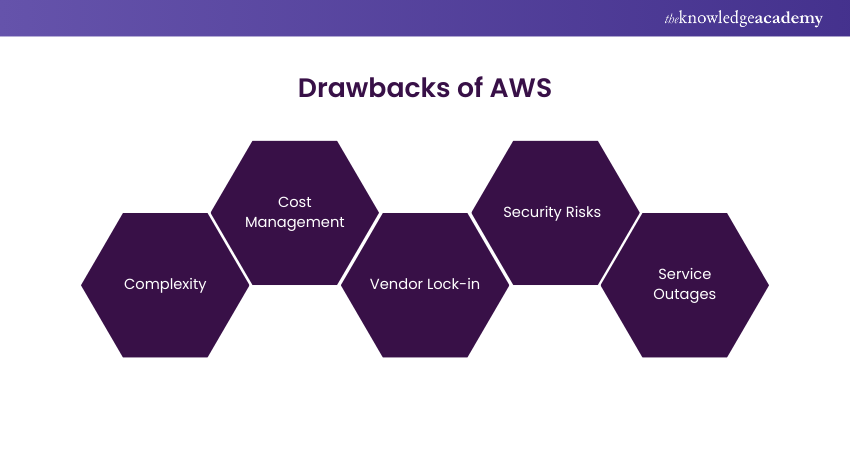
a) Complexity: AWS services are complex to manage, and the only way to configure and optimise them successfully is to have the skills, experience, and expertise.
b) Cost Management: Unlike the other AWS, it may be expensive as the more you use, the more expensive it will become.
c) Vendor Lock-in: Many businesses may continue using the AWS vendor highly and make it hard to switch to different alternatives when they have invested heavily in the corresponding AWS services.
d) Security Risks: Despite AWS's high-priority security, proper security measures for applications and data safety are still recommended.
e) Service Outages: Regardless of its trustworthiness, AWS can face outages and situations that may affect the businesses on which its services depend.
Unlock the secrets to acing your AWS Solutions Architect Interview Questions. Practice these questions!
Applications of AWS
AWS, a Cloud Computing service from Amazon, gives customers numerous services tailored for all industries and uses. From data storage and backup, as well as Artificial Intelligence and customer interaction, AWS renders scalable and inexpensive models to address the needs of business units worldwide as these needs continuously unfold. One of the key offerings is the Benefits of Amazon EMR, which provides powerful tools for large-scale data processing. Let's explore some of the key applications. Let's explore some of the key applications of AWS in more detail:
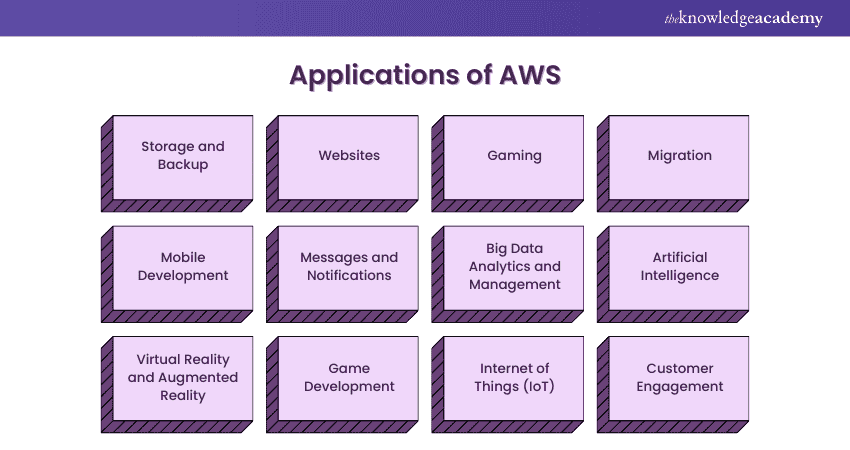
1) Storage and Backup: AWS offers secure, scalable cloud storage solutions for data backup and recovery, ensuring data integrity and accessibility anytime.
2) Websites: Host websites on AWS for high availability, security, and seamless scaling, tailored to handle varying traffic demands.
3) Gaming: AWS provides robust infrastructure to build, run, and scale gaming applications with low latency and high performance.
4) Migration: Easily migrate your existing applications, data, and workloads to AWS, minimising downtime and enhancing operational efficiency.
5) Mobile Development: AWS equips developers with tools to build, deploy, and manage mobile apps, enhancing security and user experience.
6) Messages and Notifications: Engage users with real-time messaging and notifications through AWS, ensuring timely communication across devices.
7) Big Data Analytics and Management: AWS delivers powerful analytics tools to process, store, and manage vast data sets, driving insights and informed decisions.
8) Artificial Intelligence: Integrate AI into applications effortlessly with AWS, offering ready-to-use Machine Learning models for smart, predictive capabilities.
9) Virtual Reality and Augmented Reality: AWS supports the creation of immersive VR and AR experiences, providing scalable computing power and high-speed data processing.
10) Game Development: AWS enables game developers to build, deploy, and scale games quickly, supporting high-quality graphics and multiplayer functionalities.
11) Internet of Things (IoT): Connect and manage IoT devices with AWS, enabling secure data collection, analysis, and device management for smarter operations.
12) Customer Engagement: AWS helps businesses enhance customer interactions through personalised experiences, data-driven insights, and multichannel communication tools.
Become a professional with our in-depth course on AWS Professional Solutions Architect Training – join now!
AWS Pricing Models, Competition and Customers
Amazon Web Services (AWS) offers flexible pricing models that cater to diverse business needs, making it an industry leader in cloud services. Below is a breakdown of AWS’s pricing structures, competitive positioning, and some notable customers.
1) AWS Pricing Models
a) Pay-as-you-go: AWS operates on a pay-as-you-go basis, charging per hour or per second of usage. This model offers cost-efficiency as businesses only pay for what they use.
b) Reserved Instances: Customers can save costs by reserving computing capacity in advance and receiving discounts when committing to one- or three-year contracts, with further savings for prepayments.
c) Volume-based Discounts: AWS rewards high usage with volume discounts—the more data you consume, the lower the per-gigabyte cost, providing significant savings for heavy users.
d) Free Tier Options: AWS offers a Free Tier, allowing new customers to explore and build using AWS services at no cost.Pricing Calculator and Expert Guidance: AWS provides a pricing calculator for estimating costs and certified third-party experts to guide customers in selecting the best pricing model.
2) Market Position and Competition
Market Leader: AWS remains a leader in the cloud market, holding 31% of the global market share in 2025, according to Synergy Research Group.
Top Competitors: AWS leads the Infrastructure as a Service (IaaS) market, surpassing major competitors like Microsoft Azure, Google Cloud, and IBM, thanks to its vast service offerings and flexible pricing.
3) Notable AWS Customers
AWS powers a diverse range of globally recognised companies across industries, including:
a) Airbnb - Innovating in hospitality with scalable cloud solutions.
b) AstraZeneca - Supporting life sciences with secure data management.
c) BMW Group - Driving automotive technology with powerful cloud infrastructure.
d) Capital One - Enhancing financial services with cloud efficiency.
e) Coca-Cola - Streamlining operations in the beverage industry.
f) Fox - Delivering media and entertainment with AWS’s robust platform.
g) Goldman Sachs - Leveraging cloud for secure financial data analysis.
h) Heineken - Optimising brewing operations through data insights.
i) Netflix - Powering streaming services for millions worldwide.
j) NFL - Enhancing fan engagement with AWS analytics.
k) Philips - Innovating in healthcare with scalable cloud solutions.
l) Pinterest - Supporting image sharing at massive scale.
m) Salesforce - Integrating cloud solutions for customer relationship management.
n) Toyota - Advancing automotive innovation with AWS technology.
AWS’s blend of flexible pricing, market dominance, and a diverse customer base makes it a go-to choice for businesses looking to scale efficiently in the cloud.
Get the job you want by mastering Firebase Interview Questions and Answers. Boost your confidence and ace your interview!
AWS Services
Amazon offers a wide range of cloud application services. Here are some key AWS services and how developers use them:
Compute Services
These services help developers build, deploy, and scale applications in the cloud.
a) AWS EC2: A service that lets developers rent virtual machines and automatically scale compute power when needed, especially when considering Installing AWS CLI. It offers different types of instances based on your application’s CPU, memory, storage, and networking needs.
b) AWS Lambda: A serverless service that runs code for applications without the need to manage servers. It helps developers execute programs easily and quickly. An AWS Lambda Cheat Sheet can provide essential guidelines on optimizing performance, managing event triggers, and reducing execution costs.
Storage
AWS provides cloud storage for data backup and disaster recovery with high durability.
a) Amazon S3: A cloud-based storage service for online data backup, making it easier for developers to store data on a web-scale.
b) Amazon EBS: Provides persistent storage volumes for data, mainly used with Amazon EC2 instances. It is ideal for storing files, databases, and block-level data.
Database
AWS offers cost-efficient, secure, and scalable database services.
a) DynamoDB: A NoSQL database service that is fast, reliable, and scalable. It has built-in security features, along with backup and restore options.
b) RDS: A managed service designed to simplify the setup, operation, and scaling of relational databases in the cloud for developers.
Networking and Content Delivery
AWS connects physical networks to private clouds with high-speed transfers.
a) VPC: Let developers create a private cloud within AWS and manage resources like EC2 instances. It offers control over IP address ranges, subnets, route tables, and network gateways.
b) Route 53: A Domain Name System (DNS) service that translates domain names into IP addresses, helping route traffic to cloud applications.
Developer Tools
These tools help developers build, deploy, and run applications efficiently.
a) CodeStar: A service that helps developers manage the development of applications, enabling quick building and deployment on AWS.
b) CodeBuild: A service for building and testing code with continuous scaling, making it easier to compile code, run tests, and create deployment-ready output.
Security, Identity & Compliance
These services monitor the security of AWS resources and control access to them.
a) IAM: Identity and Access Management helps manage secure access to AWS services by setting permissions for users and resources.
b) KMS: A service that helps create and manage encryption keys to secure data within AWS applications.
Management Tools
These services help optimise costs, reduce risks, and automate resource management.
a) CloudWatch: A tool that monitors AWS resources and applications. It gathers operational data from logs in one place.
b) CloudFormation: A service that helps developers manage AWS resources by creating templates or text files for cloud infrastructure, saving time on resource management.
Enhance your knowledge of how to develop and deploy a robotic application – register now for our AWS RoboMaker Training.
What is the Most Popular Language for AWS?
The most popular languages for AWS are Python and Java. Python is known for its simplicity and is widely used for tasks like automation, data processing, and machine learning. Java is also commonly used for large-scale enterprise applications, thanks to its stability and scalability with AWS services like Lambda and EC2. Language support and ecosystem are important considerations when evaluating different cloud platforms, such as in a Firebase vs AWS analysis, where Firebase primarily focuses on client-side development with web and mobile SDKs.
Prepare for your next interview with the top AWS Security Interview Questions. Get ready to ace your interview now!
What is the Most Common AWS Database?
Amazon Redshift is the most widely used AWS database, trusted by over 15,000 active customers. It is a high-speed, scalable data warehouse service tailored for big data analytics. With its ability to efficiently store and process large datasets, along with seamless integration with AWS Big Data tools, Redshift stands out as a preferred solution for businesses aiming for rapid data analysis.
Preparing for an AWS interview? Our AWS Interview Questions guide will help you get ready with top questions and expert answers.
Conclusion
AWS stands as a powerful and versatile cloud platform, offering a wide range of services to drive innovation, enhance efficiency, and scale with ease. Whether you're a startup or an enterprise, AWS has the tools to transform your business. We hope this blog on What is AWS? has helped you understand AWS and inspired you to explore its potential! For those aspiring to specialize in AWS cloud solutions, tackling an AWS Solutions Architect Associate Project can help build a strong foundation for your career.
Learn foundational AWS cloud concepts with our AWS Cloud Practitioner Training – Join today!
Frequently Asked Questions
What Type of Cloud is AWS?

AWS is a comprehensive public cloud platform offering IaaS, PaaS, and SaaS services. It provides on-demand computing resources, storage, and applications, making it highly scalable and cost-effective for businesses of all sizes.
How Secure is AWS?

AWS ensures security through data encryption, identity access management, multi-factor authentication, and compliance certifications. It employs robust physical and network security measures to protect data and applications in the cloud.
What are the Other Resources and Offers Provided by The Knowledge Academy?

The Knowledge Academy takes global learning to new heights, offering over 3,000 online courses across 490+ locations in 190+ countries. This expansive reach ensures accessibility and convenience for learners worldwide.
Alongside our diverse Online Course Catalogue, encompassing 19 major categories, we go the extra mile by providing a plethora of free educational Online Resources like News updates, Blogs, videos, webinars, and interview questions. Tailoring learning experiences further, professionals can maximise value with customisable Course Bundles of TKA.
What is The Knowledge Pass, and How Does it Work?

The Knowledge Academy’s Knowledge Pass, a prepaid voucher, adds another layer of flexibility, allowing course bookings over a 12-month period. Join us on a journey where education knows no bounds.
What are Related Courses and Blogs Provided by The Knowledge Academy?

The Knowledge Academy offers various AWS Certification Courses, including the Architecting on AWS - Associate Certification Course, AWS Professional DevOps Engineer Training, and Systems Operations on AWS - Associate Certification Training. These courses cater to different skill levels, providing comprehensive insights into AWS Careers.
Our Cloud Computing Blogs cover a range of topics related to AWS, offering valuable resources, best practices, and industry insights. Whether you are a beginner or looking to advance your Cloud Computing skills, The Knowledge Academy's diverse courses and informative blogs have got you covered.
Upcoming Cloud Computing Resources Batches & Dates
Date
 AWS Cloud Practitioner Training
AWS Cloud Practitioner Training
Fri 2nd May 2025
Fri 4th Jul 2025
Fri 5th Sep 2025
Fri 7th Nov 2025






 Top Rated Course
Top Rated Course



 If you wish to make any changes to your course, please
If you wish to make any changes to your course, please


